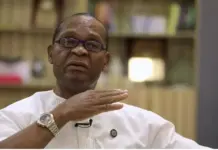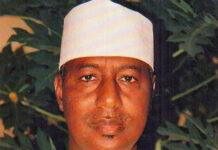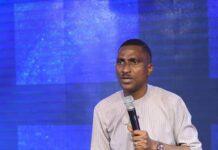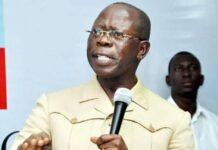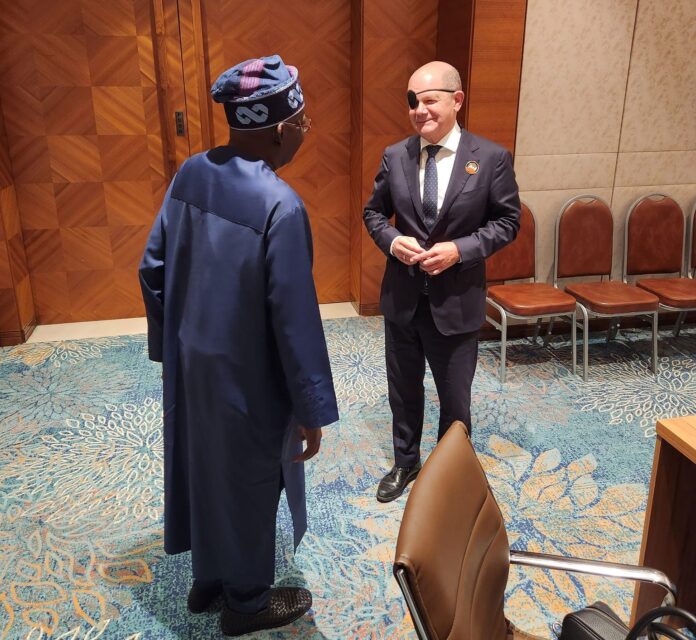On Monday, President Bola Tinubu reaffirmed Nigeria’s unwavering pursuit of German investment in specific areas of the country’s domestic economy, emphasizing that his administration is concentrated on vital growth-enabling industries such as energy, transportation, and the generation, transmission, and distribution of electric power.
At the G20 “Compact with Africa” Economic Conference, this constituted the central topic of conversation between the leader of Nigeria and German Chancellor, Olaf Scholz.
Read Also: Union applauds Tinubu for cancelling 40% IGR deduction policy for tertiary institutions
In a statement headed “President Tinubu meets German Chancellor Scholz; advances negotiation on German investment in power and rail transportation sectors,” Ajuri Ngelale, the President’s Special Advisor on Media and Publicity, disclosed this information on Monday.
The President expressed gratitude to Siemens AG for its successful efforts to improve both the quantity and quality of Egypt’s electric power supply.
There, he promised that the uneven and erratic rollout of the Presidential Power Initiative, backed by Siemens, would pick up speed under his direction and be carried out with greater project execution planning.
This was in line with his realization that, in order to ensure the project’s viability, Siemens technology had to be embraced in all respects.
The President declared, “I am firmly committed to exploring every facet of the Siemens Power project and the skill-development prospects that will arise from that endeavor for our gifted youths who can engage in maintaining the industry.”
Tinubu expressed his keen interest in the role Siemens can play in modernizing and expanding Nigeria’s rail network with the provision of ultra-modern trains and railways. He was referring to the new 2,000km ultra-high-speed rail network that Siemens is currently constructing across 60 cities in Egypt at a speed of 230km/hour.
He pointed out that these would more than double the current 100 km/h standard-gauge networks’ speed in Nigeria.
In response, the German Chancellor stated that he was prepared, but he also acknowledged that resolving the financial and administrative obstacles resulting from governance issues that were left over from previous governments in the industry was necessary.
“I am aware that a great deal of work has been completed,” Scholz remarked. Nigeria is now producing a lot of power, but not enough of it is reaching the people.
Naturally, this relates to the requirement for stations and other infrastructure to be provided for the grid. Siemens has worked out the strategy and is prepared to take it further; nevertheless, it is now up to your new administration to carry out the additional measures that you have now promised to undertake.
Siemens has shown its willingness to proceed with the railway plans once the power project, which has already commenced, progresses further.
Tinubu made the German leader aware of the necessity for his business community to concentrate on value-added processing in Nigerian automotive, agricultural, and solid mineral industries, as well as other subsectors of the economy that generate employment.
He declared, “Reforms to Nigeria’s business environment are underway, meeting all global requirements.”
Maybe those international investors still harbor a small paranoia about the unsolvable nature of the old Nigerian problems.
But my performance history speaks for itself. Up to now, I have changed an entity. I shall do it again because I am here to do so.
“There is nothing too unique about China’s growth,” the German Chancellor added, nodding in agreement.
In order to facilitate easy imports and exports, a significant amount of foreign investment was made, leveraging inexpensive, skilled labor as well as sufficient internal and shipping infrastructure.
These are attainable in Nigeria. You even possess a wealth of natural resources. It is attainable little by little, Mr. President.
The two men who oversee the biggest economies in Europe and Africa, respectively, decided to intensify cooperation in utilizing cutting-edge border control and biometric technologies to prevent unauthorized migration.
They also concurred that investing in labor-intensive industries will significantly contribute to addressing the underlying causes of the issue.
Before attending the Summit of Heads of State and Government for the Compact with Africa, Tinubu later had a discussion about his ideas with Frank-Walter Steinmeier, the Head of State and Federal President of Germany.
Join Television Nigerian Whatsapp Now
Join Television Nigerian Facebook Now
Join Television Nigerian Twitter Now
Join Television Nigerian YouTUbe Now

